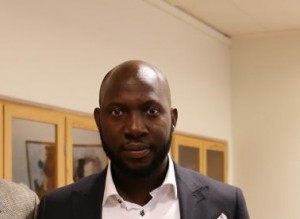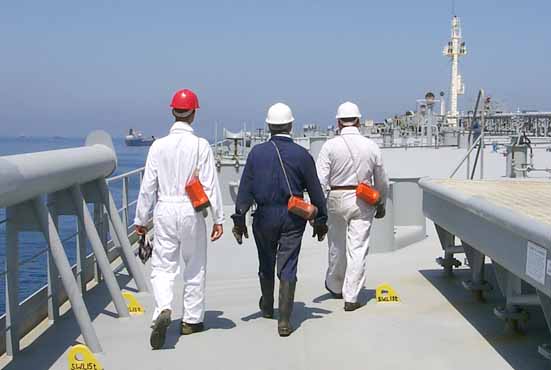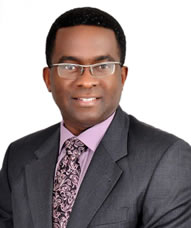How To Know A Marine Engineer

Mr. Fredrick Ugo Ikioumoton is the Assistant Director, Shipping Promotion, Nigerian Maritime Administration and Safety Agency (NIMASA), and this week, he features as our Shippers’ Guide, in this exclusive interview with Ifeoma Oguamanam on what you need to know of a Marine Engineer.
What is marine engineering?
Marine engineering is an arm of engineering that is divided into different segments; under marine engineering, you have the naval architecture and the power plant engineer. The naval architectures are the people who design while the power plant engineers do the building. I am a power plant engineer by training and to become a marine engineer there is a process you have to undergo, this training is in form of a degree in a university that offers that course for a period of five years and before you graduate you must have gone through what is called the sea time experience.
While studying other courses require industrial training, in marine engineering you are required to go for sea time training, this means that you have to take time to get used to the environment at sea, get used to the machineries that you have been taught in class, you see and identify them with your physical eyes and put to practice what you have learnt by actually working with the machines.
What is the designation and responsibilities of a marine engineer?
It depends on who you work for, if you are working on board a ship, there are ranks; from the Chief Engineer to the Second Engineer and lastly, the Third Engineer, depending on the capacity of the ship. The Chief Engineer is in charge of all machineries on board the ship, from the main engines to the generators, to the cranes and all other machineries.
He is in charge of them while at sea, they are also what we call the on shore engineer, the on shore engineer most times sail with ship from one point to another and from destination to destination, so while at sea the chief engineer is in charge even while at port but in a situation that requires a major engineering work to be done, he involves their shore engineer or people that they consult with.
What does it take a Marine Engineer to be accredited to be on board a vessel?
To be on board a ship the most important thing is the degree, the next is the Certificate Of Competency (COC).
The COC can be obtained when you have the prerequisite sea time experience, even as an engineer, that is why while studying you have to go to sea to get sea time and a number of weeks normally qualifies you for a particular Certificate Of Competency, when you have that qualification you can now go and sit for the examinations, after sitting for the examinations, and you pass you become either a Second Engineer or a Chief Engineer.
You have to go through the ranks, you have to start as a Third Engineer after getting the number of required sea time you proceed to write the examinations to become a Second Engineer, if you want to be a Chief Engineer, you go again to get the required sea time after which you sit for the examination and if you pass you are awarded with the COC that qualifies you as a chief marine engineer. The Chief Marine engineer is the highest ranking officer on board any ship in the engine room but the master of the ship is the Captain.
In which of the schools In Nigeria can someone study marine engineering?
There is one university in Nigeria called the Rivers State University of Science and Technology ( RUST), in Port Harcourt, Rivers State, where marine engineering is studied as a degree course, then there is also the Maritime Academy in Nigeria (MAN) Oron ,Akwa Ibom State, where marine engineering courses are on offer, after you go through that process when you graduate and you meet the criteria to become a Marine Engineer, you are awarded with a degree in marine engineering and you become a Marine Engineer.
How much does some of these training costs?
I really cannot say because I am not a rector at any of these schools but it is just like going to any other school, you go through the first year to the final year and in the process fees change, prices change, among other factors, so it will be difficult to estimate and for the COC examinations, they are not really expensive, like in Nigeria for instance, we are not qualified to certify engineers that want to become Master Mariners, so most Master Mariners you see in Nigeria got their certification from outside the country.
Why is Nigeria not qualified to train master mariners?
There are criteria that pre- qualifies you to train and we have not met those criteria in MAN, Oron, so people who desire this training have to go to Singapore or London and other countries abroad and right now NIMASA has come to the aid of some students who cannot afford the training on their own because to study abroad is capital intensive.
NIMASA has close to four thousand students studying different aspects of engineering including marine engineering outside the country, both deck officers and engine room officers because presently when you go to most shipping companies they will tell you that there are no qualified Nigerians for certain positions and I believe that when these Nigerian students outside Nigeria graduates from their trainings, these excuses from shipping companies will be a thing of the past. That is why relevant authorities should consider it is mandatory to invest attention and resources in manpower development.
A maritime university is under construction in Delta state by NIMASA and a lot has been invested in Nigerian maritime institutes including MAN Oron, I believe in a couple of years this university will be completed and the challenge of obtaining any level of COC to work on board any ship can easily be attained here in Nigeria.
At the moment, most Nigerian vessels have non Nigerians as majority, of their crew members, does that mean that the engineers we have here are not well trained?
Most times these are just excuses from the shipping companies, that is why we have the maritime labour department in NIMASA and this department is enforcing that this things should not happen, except in cases where there is no Nigerian that has that skill or qualification, but as far as there is a Nigerian with that skill and qualification, the labour department is ensuring that those lapses are corrected.
Is there a law to that effect?
Yes, it is in the Cabotage Act, the act protects the right of indigenous participation in the maritime industry and that includes the area of employment, so, it is being implemented, that is why a department in NIMASA is saddled with the sole responsibility of taking care of the implementation. They go on board vessels to check the crew and ensure that positions that are for Nigerians are manned by Nigerians.
What will be your advice for those that want to be Marine Engineers?
Maritime engineering is a very vast and interesting profession and I will advise anyone that wants to become a marine engineer to go ahead, because about 90% of world trade volume is done by shipping, and so shipping is the future and whoever is going into shipping is going into the future and there is so much prospects for engineers in the maritime industry.








One Comment